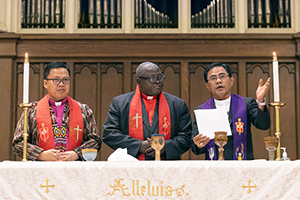Key points:
- In what presiding Bishop David Graves called a “historic moment,” General Conference on May 2 passed new legislation granting authority to deacons to preside at the sacraments "when contextually appropriate."
- This means deacons can now offer communion and conduct baptisms in their context, whether that is a church, outreach ministry or mission.
- After the vote’s passage, many celebrated the historic change, which should take effect Jan. 1. Many hugged and wept tears of joy.
Deacons can now preside at the sacraments "when contextually appropriate" without needing explicit permission from their bishop.
In what presiding Bishop David Graves called a “historic moment,” General Conference on May 2 passed new legislation granting authority to deacons to preside at the sacraments in their ministry settings.
This means deacons can now offer Holy Communion and conduct baptisms in their ministry context, whether that is a church, outreach ministry or mission.
Deacons and elders are considered clergy in The United Methodist Church, but deacons are ordained for ministries of word, service, compassion and justice — serving as a bridge between the church and the world. Elders are ordained for ministries of word, sacrament, order and service.
The Rev. Emily Kincaid, secretary of the Ordained Ministry Legislative Committee, who presented the legislation to delegates with the chair, the Rev. Lindsay Freeman, said the change is both necessary and in line with the denomination’s mission.
“In 1784, John Wesley founded the Methodist Movement for this very reason: to extend the sacraments to places where the Church of England was unwilling to offer them,” Kincaid said from the stage. “Deacons often find ourselves in places where the mission of God is being extended outside the local church and where elders are not always present to issue the sacraments.”
Subscribe to our
e-newsletter
She said passage would enable deacons to live into Wesley’s belief that the world is truly our parish.
Passing 448-240 with a 65% majority, the legislation drew some debate on the floor.
The Rev. Karli Pidgeon, a district superintendent in the Louisiana Conference, spoke against the change, noting that what deacons do is different from what elders do, and the church needs to further pray, study and discern how this will impact the entire church.
“It’s not a no,” Pidgeon said. “It’s a not now.”
The Rev. Karen Jones, a deacon in the South Carolina Conference, spoke in favor of the change, sharing a story of how her also-deacon husband had a spiritually moving experience that crystallized why it’s so important for deacons to have this authorization.
No elders were available, so her husband was granted the authority to give the sacraments at a memory care unit to a woman who at first called the bread “a cookie.”
Yet when the transformed body of Christ touched her tongue, Jones said, “Her eyes lifted as if scales had fallen off, and she said, ‘I know what this is!’”
Jones urged the body to approve the legislation, “So that we may joyfully be obedient to the Holy Spirit in bringing sacraments to a broken world.”
The Rev. Megan Walther, Michigan Conference, also spoke in favor of the passage, sharing, “We elders should not have the monopoly on the sacraments.”
After the vote’s passage, many celebrated the historic change, which should take effect Jan. 1. Many hugged and wept tears of joy.
One deacon, the Rev. Gregory Gross of Northern Illinois, was surprised when his delegation — and his episcopal leader, Bishop Dan Schwerin — gathered around him during the break and urged him to offer Holy Communion there in the Charlotte Convention Center.
“I feel grateful to be granted as a deacon the sacramental responsibility to extend the table into the world,” Gross said after presiding over the sacraments. “That is my calling as a deacon — to bridge church and world.”
The Rev. Teresa Edwards of the South Georgia Conference called it “a really, really good, great day indeed.”
“It’s hard to express what it means to me to be able to offer the sacraments with a full heart, free and open hands not bound by the former restrictions,” said Edwards, a deacon who serves as an associate pastor at Vineville United Methodist Church in Macon, Georgia.
The Rev. Julie Wilson of the Baltimore-Washington Conference, a U.S.-based missionary serving at a community center in North Carolina, said the change is significant for her ministry.
“It means that I don’t have to chase after an elder whenever I want to try and offer communion to the folks that I’m in community with,” Wilson said after the vote.
She also said it’s less confusing in her ministry setting, as many people didn’t understand why she couldn’t offer them communion.
“They do call me ‘Pastora,’ and I am clergy,” Wilson said. “But then for me to say, ‘No, I don’t have those privileges’ is confusing to them because all the clergy they know, do.”
Jones also is overjoyed.
“When I saw the vote come up on the screen, I thought of all of the deacons who have longed to be obedient to their call,” she said. “I thought of all the opportunities for sharing the means of grace that have been missed — and now no opportunity to share this means of grace will be missed.”
Jessica Brodie is editor of the South Carolina United Methodist Advocate. Erik Alsgaard, Dan O’Mara and Kelly Roberson contributed to this story.
News media contact: Julie Dwyer at (615) 742-5470 or newsdesk@umnews.org. To read more United Methodist news, subscribe to the free daily or weekly Digests.




